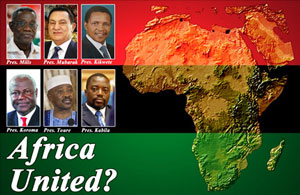
(FinalCall.com) – John Atta Mills has become president of Ghana, returning the National Democratic Congress, the party founded by former president, Jerry Rawlings, to power after an eight year hiatus. Some analysts believe the recent election in Ghana marked a new era of democracy in Africa.
“That is the greatest lesson for Africa,” stated a representative of the Nigerian-based Alliance for credible Elections, according to press reports. Francois Grignon, analyst and Africa director for the International Crisis Group said the Ghanaian election resonated throughout the whole of Africa. “In 2009 we have to try to get some more positive results,” Mr. Grignon said.
Voters in Angola, Botswana, Malawi, Mozambique, Namibia and South Africa are going to the polls between March and June. There are also elections slated in 2009 for Algeria, Comoros, Congo-Brazzaville, Equatorial Guinea, Niger, Sudan and Tunisia.
Analysts are also saying that more African nations are moving towards stability and peace; the African Union has asserted itself as a regional diplomatic and peacekeeping force; and there are signs of a growing middle class throughout the continent. Mobile phones and the internet are also revolutionizing how Africans communicate throughout the continent.
Akbar Muhammad, journalist, author and director of the African Middle East Literary Association calls this the era of a new “African Renaissance.” “There is a new leadership emerging, coming out from behind the shadows of the old,” Mr. Muhammad told The Final Call.
“The key in Africa is what happens in Egypt if President Hosni Mubarak’s son does not succeed him, then there is a strong possibility that a new leadership would emerge in Egypt, which is very important for Africa,” Mr. Muhammad said.
Mr. Muhammad also said Tanzanian Pres. Jakaya Mrisho Kikwete, Sierra Leone’s Pres. Ernest Bai Koroma, Mali’s Pres. Amadou Toure and Pres. Joseph Kabila of the Democratic Republic of the Congo, were African leaders to watch.
“The economic collapse of the Western world offers a golden opportunity for Africa,” Mr. Muhammad said. There are 900 million people on the continent, and that is rapidly growing to a billion, he said. Economic experts say that from the Cape to Cairo there is an economic bloc with a combined Gross Domestic Product of U.S. $625 billion; and that’s not counting the Northern African nations.
“We need leaders in Africa with a mindset to restoring Africans at the head of the human family,” stressed Dr. Leonard Jeffries professor of African Studies at City Univ. of New York. “The world economic collapse means people around the globe will be getting together to re-group; and that means Africa has to come together to place Africa at the global economic table as equal partners,” Dr. Jeffries said.
Both Dr. Jeffries and Mr. Muhammad say that Africa must adopt Pres.-elect Barak Obama’s vision of “change.”
However, some American-based analysts and think tanks such as Africa Action believe that the new administration should not concentrate on African economic issues at first, urging Mr. Obama to make human rights in Sudan a priority from day one.
The Washington-based Africa Focus Bulletin said Somalia should be the first test of an Africa foreign policy for the Obama administration to correct “a short-sighted U.S. policy that has actively contributed to worsening an already desperate situation.”
“Somalia is a good place to start as any; and I understand that Mr. Obama has expressed interest in the crisis in the Democratic Republic of the Congo (DRC). He has expressed a need for change in the U.S. role in developing economics and peace in Africa,” Bill Fletcher, executive editor of the Black Commentator and founder of the Center for Labor Renewal told The Final Call.
Sadia Aden, president of the Somalia Diaspora Network explained to The Final Call that “in talking to people on the Obama Transition Team, there is a feeling that Somalia will be at the top of the new administration’s ‘first 100-day’ agenda.” There is hope Obama will learn from the mistakes of the Bush administration in Somalia, she added.
On Dec. 29, Somalian Pres. Abdullahi Yusuf Ahmed resigned. “The reaction on the ground in Somalia is that his resignation does not mean an end to the War Lords. Yusuf was the head but not the body,” Ms. Aden said.
“With a United States of Africa you would not see cases like Somalia and the DRC,” stated Mr. Muhammad. He said it is important for Africa to move towards uniting the 53 independent states that make up the African Union. “Moving towards a strong common currency for all of Africa, and establishing a central bank, that should be at the top of Africa’s priority list,” insists Mr. Muhammad.












